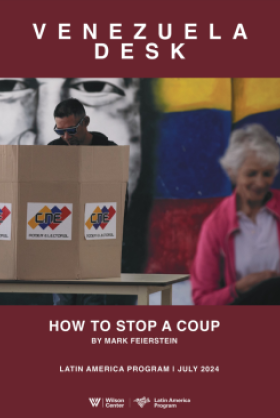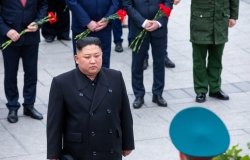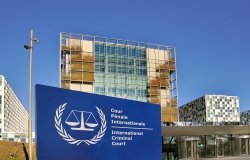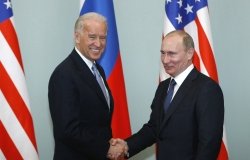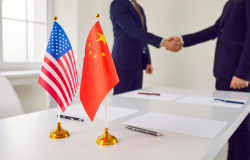U.S.-Cyprus Relations: Prospects for a Settlement
Policy Forum featuring U.S. Ambassador to Cyprus Michael Klosson speaking on U.S. efforts to help achieve a Cyprus settlement in 2004.
Overview
Remarks
by U.S. Ambassador to Cyprus Michael Klosson
January 8, 2004
Washington, D.C.
It's good to be back at the Western Policy Center. The Center does excellent work, and I welcome these discussion sessions.
I was last here talking about Cyprus in January 2003. What a difference a year makes! It's been a momentous period, comprising a roller coaster ride in the U.N.-hosted settlement effort; the successful culmination of Cyprus?s drive to join the European Union; the tremendous, positive boost in interaction between Greek and Turkish Cypriots when the Turkish Cypriot side relaxed restrictions on crossing the buffer zone last April; and significant elections in the north last month.
Much of the embassy's effort is focused on resolving the "Cyprus problem," but there is a lot more going on in our relations with Cyprus than just that. I would like to begin today reporting on a broad range of issues where we have seen a number of accomplishments.
Our relationship with Cyprus is gaining in significance. By joining the European Union, Cyprus joins not only Europe, but also the trans-Atlantic partnership. It has stepped onto a broad, new playing field, acquiring new responsibilities as well as new opportunities. It has become more important to both Europe and the United States. Just as Cyprus is receiving more attention from the United States and Europe on a broader range of issues, we, too, expect more engagement by Cyprus on those same issues.
We have four major priorities in our relationship with Cyprus.
Anti-Terrorism
First and foremost is cooperation in the war on terrorism and efforts to deny weapons of mass destruction to dangerous groups and countries. Given the island?s strategic location in the eastern Mediterranean, we welcome Cyprus?s active involvement in this international effort. We have enjoyed its support on a multitude of levels: from upgrading the physical security and police presence around embassy facilities to improved security measures at ports and airports, tighter customs controls, and cooperation from the Attorney General and the Central Bank on stemming the financing of terrorism.
Although Operation Iraqi Freedom was controversial in Cyprus, as it was with public opinion in most of Europe, the government did approve overflight rights for U.S. military aircraft. And, in October, the Cypriot delegation to the Madrid donors conference for Iraq made a helpful pledge of assistance, which was substantial when measured by Cyprus?s past contributions. Cyprus is now the temporary base for U.N. operations in Iraq until the security situation improves.
We also look forward to strengthening our concrete cooperation with Cyprus in joint efforts to thwart the spread of weapons of mass destruction. Together with our international partners in President Bush?s Proliferation Security Initiative, we have opened a dialogue with Cyprus on how it can assist this vital campaign. With one of the largest merchant fleets in the world under Cypriot registry, we believe there is a very positive role for Cyprus to play in counter-proliferation efforts.
Law Enforcement Cooperation
We have a solid record of cooperation in the field of law enforcement, including two extraditions over the past year and regular cooperation between our Drug Enforcement Administration and the Drug Law Enforcement Unit of the National Police.
One good example of cooperation took place in December. The Greek police, with the help of the Cyprus police and American authorities, uncovered a U.S. dollar counterfeiting operation in Greece. A raid resulted in the arrests of four accused perpetrators as well as the seizure of counterfeit bills and equipment. The counterfeiting ring planned to circulate the money during the 2004 Olympic games in Athens. The involvement of the Cyprus police and that of our embassies were key components of this success.
Another potential area of cooperation involves trafficking in persons, a scourge that affects many nations, including the United States and Cyprus, and represents a regional problem. The Cypriot Ombudsman issued a report in November recommending additional measures to combat traffickers? abuse of Cyprus as a destination. The concerned ministers have held a series of meetings to develop a national strategy. In my meetings with these ministers, I have offered any U.S. expertise, assistance, and cooperation that Cypriot authorities might consider helpful.
Economics and Trade Promotion
Cyprus and the U.S. enjoy excellent commercial relations, and the embassy is working to make them even better. In 2002, the U.S. exported $202.8 million worth of goods to Cyprus, making us Cyprus?s seventh-largest supplier. And Cyprus exported $18.9 million worth of goods to the United States, making the U.S. Cyprus?s eleventh-largest export market.
Thirty-five American-owned companies, subsidiaries, and partnerships operate on the island, employing hundreds of Cypriots. These firms include IBM, Exxon Mobil, and Cisco Systems. Just last month, Alteera, an international consortium that includes Bechtel International, won the status of preferred bidder for Cyprus?s largest public tender ever: the construction and operation of two international aviation terminals in Paphos and Larnaca. Assuming that negotiations between Alteera and the government of Cyprus result in a final contract, this will take our commercial ties to a new level. This sort of foreign direct investment is in addition to the hundreds of U.S. brands, such as Kelloggs, Nike, McDonalds, and Burger King that are available in the local economy, often first having been manufactured in and imported from Europe. Just last month, Starbucks opened its doors in Nicosia.
The bottom line is that by accepting the EU acquis, Cyprus has liberalized its market place, and America has been a strong beneficiary of this. It?s a win-win situation. By lowering non-tariff barriers to trade, Cyprus realizes powerful economic growth as well as the diversification of its markets.
Of course, while membership has its privileges, it also has its challenges. By joining the EU, Cyprus will now be part of headline grabbing debates on steel, biotechnology, farm subsidies, and competition policy. But the controversies are just a small piece of the U.S.-EU trade relationship Cyprus has now become a part of. We have so much to gain from this integration. For instance, the government of Cyprus?s goal of diversifying its economy and trying to develop a technology sector that utilizes its highly skilled and educated workforce makes a lot of sense. This is a natural area of collaboration between the U.S. and Cyprus. Harvard University and Cyprus, for example, are looking at initiating a regional program in the environment and public health.
Foreign Policy Cooperation
Our fourth priority is cooperation on foreign policy issues. As I mentioned earlier, Cyprus has become more important to the United States because it now has a voice in EU councils and soon will have a vote. The U.S. government sent a team of senior officials last spring to the other nine new accession states to discuss how U.S.-EU relations operate. We now engage officials of the government of Cyprus on many new issues.
A Cyprus Settlement
Now to the issue that defines much of our work: a comprehensive settlement of the Cyprus problem, the longest standing item on the U.N. Secretary General?s peacekeeping agenda. We are going through a critical phase in international efforts, which could yield a settlement in a matter of months if the parties demonstrate the political will necessary for the U.N. Secretary General to resume the U.N. talks. Although a solution has eluded many for many years, it is by no means a pipedream. In fact, developments over the past year have made the prospect of a settlement more tangible for hundreds of thousands of Greek and Turkish Cypriots alike as they have resumed contact after decades of separation.
Europe remains a strong catalyst for efforts to achieve a solution. The European Union reiterated its preference last month for a reunited Cyprus to join the EU in May and noted that a settlement would greatly facilitate Turkey?s own membership aspirations. With Cyprus?s signature of the accession treaty last April, Greek Cypriots no longer feel threatened by the possibility of delayed membership. This sense of confidence can play a positive role in the solution process. A settlement would also open the EU?s door to Turkish Cypriots, who are overwhelmingly in favor of full membership as soon as possible and are beginning to enjoy some benefits from EU programs in the north. And the Turkish government, elected a year ago, has made EU membership a top national priority, is carrying out numerous reforms that have been well received by the EU, and wants accession negotiations to begin as soon as possible.
The stakes for the United States in a settlement are clear and significant. A settlement will benefit Cypriots from one end of the island to the other economically, politically, and culturally. If the two sides take advantage of this opportunity, then Cyprus?s full potential can and will be unleashed. A settlement would resolve an important dispute between two NATO allies. Although not a formal condition for initiating accession negotiations with Turkey, the EU has made clear that a Cyprus solution would also greatly facilitate Turkey?s own European aspirations. That is something the United States has long championed. In sum, a settlement would be a win-win situation for all the parties and would make a vital contribution to peace, stability, and prosperity in a critical region.
We were, of course, disappointed that the direct U.N. talks between the two sides did not reach agreement last March to put the Secretary General?s settlement plan to a vote in the two communities, largely because of the Turkish Cypriot side?s position. All is not lost, however. In fact, we have in hand a number of elements and developments that bolster the current opening for achieving a settlement.
Let me mention three from my perspective on the island that could make 2004 the year of a Cyprus settlement rather than another chapter in the seemingly never-ending saga of the search for a solution:
The Annan Plan
The first is the Annan plan, an initiative tabled last year and supported by the U.N. Security Council. The Annan plan is a comprehensive document that provides both a blueprint for a functioning government and a roadmap to a brighter future in the European Union for Greek and Turkish Cypriots. It does this by embracing the idea of a bizonal, bicommunal island with a single international personality. That idea has been a touchstone for both sides of the Cyprus dispute for many years. The Annan plan is arguably the most comprehensive and detailed proposal of its kind. It remains on the table for all parties to carry forward.
Crossing the Buffer Zone
The second significant development was the Turkish Cypriot side?s decision last April to relax restrictions across the buffer zone. Instead of a chill settling across the island following the end of U.N.-hosted direct talks last March, this initiative has had an overwhelmingly positive impact on the island?s atmosphere. With over two million crossings to date and a huge boost in interaction between Greek and Turkish Cypriots after decades of separation, the prospect of a solution and membership in Europe has become more concrete. A solution is no longer an abstract goal to which everyone pays lip service. It is no longer something left to everyone?s imagination, or dreams. A real solution, one with tremendous benefits and opportunities, but also some uncertainties and costs, is now at hand. It is tangible, palpable. It can be realized.
Greek and Turkish Cypriots alike can now put faces on "the other side." They now have recent, first-hand experience with those with whom they will share the island. With the Annan plan on the table, everyone can now visualize the architecture of the solution: how the United Cyprus Republic?s institutions will be organized, what safeguards exist to protect one?s rights, how security and equality will be reinforced, and what benefits will result from membership in the European Union.
Both sides have further work to do to promote genuine, lasting reconciliation, but the experience of the past eight months certainly defies claims that Greek and Turkish Cypriots can?t work together or live in peace in modern day Europe. I don?t mean to imply that these months have turned 50 years of history on its head, so safeguards are required. But, if we look at the Annan plan in light of these recent encouraging developments, we can say there is a secure and functional structure set forth in the plan that will be established on a foundation of recently confirmed goodwill between individuals. That is the way to build on the process of reconciliation we have witnessed in recent months.
For those of you who have not been to Cyprus during the past year, the stories arising from this interaction are quite moving. One Turkish Cypriot, for example, went to his former village near Paphos to find a Greek Cypriot who tried to kill him in 1964, so he could forgive him. When he arrived at the village, it turned out that the Greek Cypriot had passed away. "Let God forgive him. I have forgiven them all," the Turkish Cypriot said. Similarly, Greek Cypriots visiting their former homes in the north have been welcomed warmly and, in many cases, have been given family heirlooms preserved for decades.
This relaxation of restrictions has also made possible unprecedented visits by leaders of political parties and chambers of commerce. It facilitated establishment of a bicommunal association, the Economic Forum in Cyprus, aimed at promoting a solution. Between 5,000 and 8,000 Turkish Cypriots now work daily in the south. Measures implemented by the government of Cyprus have also facilitated the issuance of thousands of passports, identity cards, and other documents to Turkish Cypriots and have given them access to medical care in the south.
There have been no serious incidents of intercommunal violence, which is remarkable given the island?s history. Although the overall record has been positive, we have observed difficult experiences for individuals and mixed messages, as well. Romanticizing about former homes, in some cases, ran up against the cold reality of the present as many discovered that they were gone or ruined. For some, the visit to their former home was so overwhelming they decided not to repeat it.
Finally, although increased interaction between Greek and Turkish Cypriots has been helpful, it has also spurred questions from Turkish Cypriots about whether Greek Cypriots are indeed sincerely interested in a settlement. If so, they ask, why are Greek Cypriots so reluctant to make use of Turkish Cypriot shops and restaurants when they visit the north? Why the ban on overnight stays in the north? With the ease of crossing, why has it not been possible to get on-island trade going? What does this behavior say about the readiness of the two sides to share the island?
Political Change in the North
The third development contributing to the prospects for a solution is the unprecedented political ferment we have seen in north Cyprus over the past year. Turkish Cypriots are making their voices heard. This began in late 2001 and continued into the spring of 2002 with massive pro-solution demonstrations in north Nicosia calling on the authorities to support the Annan plan.
We saw this same ferment in the December 14 parliamentary elections in the north. That vote was historic because Turkish Cypriots were truly voting on their future that day. It was their chance to express their will on the question of EU membership and a Cyprus settlement.
The pro-solution parties outpolled the establishment parties which campaigned against the U.N. peace plan (50.3 percent to 49.7 percent), although, under the Turkish Cypriot seat distribution system, the votes translated into an even split of 25 seats for each camp in the assembly. The important point, however, is the trend. Compared to the 1998 vote, the two establishment parties lost between one third and one half of their support. The pro-solution parties, by contrast, increased their number of popular votes by about 70 percent and nearly doubled their number of seats. For the first time in the north?s political history, the pro-solution Republican Turkish Party, headed by Mehmet Ali Talat, became the largest in the assembly after decades of domination by the establishment National Unity Party (UBP) and was given the mandate to form a new government.
This outcome is all the more noteworthy given the pressures Turkish Cypriot voters had to confront. The American Embassy in Nicosia as well as the EU and several non-governmental organizations had serious concerns going into the elections about whether the process would be free and fair. The University of Oslo had several observers on the ground who will be issuing a report shortly. During the campaign period, we received reliable reports on a range of worrisome activities. Those activities included attempts to manipulate citizenship and voter lists, politically motivated government hiring and firings, vote buying and voter intimidation, a media environment favoring pro-status quo candidates, and legal actions discouraging the press from reporting on pro-solution candidates and parties.
A close race to be sure, but make no mistake, the message is perfectly clear. On December 14, a majority of Turkish Cypriots expressed their desire for a comprehensive settlement, one based on negotiating the U.N. plan that would enable them to join Europe by May 1 as part of a new Cyprus. Even in the area of Morphou, which, under the Annan plan, will return to the Greek Cypriot side and cause significant numbers of Turkish Cypriots to relocate, a majority voted for the pro-solution parties. This was a vote of hope over fear. This vote sent a powerful political message, and the voters? desires should be respected.
The Road Ahead
So where does this leave us? Well, certain things are clear:
First, the only way to resolve the Cyprus problem is through negotiation and mutual agreement. It cannot be imposed from the outside. The history of U.N.-brokered efforts, including the most recent developments, demonstrates that neither party can compel the other to accept a solution that is contrary to its perceived fundamental interests. Both parties will no doubt press for their essential interests if talks resume, but they must also be prepared to make accommodations, including difficult decisions and bitter compromises. Indeed, neither side has an interest in a forced settlement, the viability of which would be under a cloud.
Second, the longer the problem remains, the harder it gets to solve. The absence of a solution is not cost free for either side. Restrictions retard development in the north, but uncertainty about the future casts a shadow over the entire island, inhibiting Cypriots from achieving their full potential. The lack of certainty engenders a sense of insecurity, which only a settlement can dispel definitively. That lack of certainty damages businesses, industry, and the tourist sector on the island.
It is also becoming clearer to Greek Cypriots that they will face problems if a divided Cyprus enters the EU. There is concern that the buffer zone, which will become the eastern-most limit of the EU, not take on the character of an international border formally dividing the island. In addition, there is concern about Turkish Cypriots leaving the north and moving south to pursue their property claims in Republic of Cyprus courts.
Third, the choice Cypriots face isn?t between the Annan plan and a hypothetical "better plan," one that hasn?t been drafted yet. The choice is between negotiating the Annan plan and no solution for the foreseeable future. Both sides must conclude that it is in their best interest to seek a settlement now. They must realize that the benefits of a balanced, comprehensive settlement are more compelling than clinging to the status quo in the vain hope of achieving unrealistic expectations. The situation calls for responsible political leadership for the future.
So, the way forward to achieve a settlement by Cyprus?s May 1 accession to the European Union is to negotiate the Annan plan under the auspices of the U.N. Secretary General?s good offices mission. The plan represents the most comprehensive, good faith effort to date to bridge differences between the two sides and to ensure that their fundamental interests are respected. The Secretary General has offered to re-engage in the settlement process only if all parties express the necessary political will. That means the parties, backed by Turkey and Greece, must commit to finalizing the U.N. plan and putting it to referenda by a certain date. The United States, indeed the entire U.N. Security Council, through Resolution 1475, firmly backs this approach. We hope the parties will fulfill this requirement as soon as possible. There remains time to negotiate a solution and hold referenda before May, but the clock is ticking. After May 1, things become more difficult for all parties.
The Role of the United States
What can the United States do to help? Far from imposing a settlement from the outside, the role of the international community -- the United States, Europe, U.N. Security Council members, and others -- should be -- and in the case of the United States is -- to provide diplomatic support and assistance to the U.N. effort and to contribute to conditions on the island that can facilitate a settlement. Over the past year, President George W. Bush, Secretary of State Colin Powell, senior State Department officials, Special Cyprus Coordinator Thomas Weston, and our embassies in Europe have worked vigorously, and will continue to do so, to promote a settlement.
We also work on the island to help these diplomatic efforts bear fruit. Since the 1980s, the United States has contributed over $300 million to support bicommunal activities in Cyprus. This is a sound investment in a better future for all on the island. With these funds, the U.S. embassy promotes cooperation between the two communities and more constructive mindsets on both sides. Each year, we fund dozens of programs in areas as wide-ranging as teaching English, improving health care, helping the handicapped, and restoring historic buildings. These programs are all designed not only to make Cyprus a better place in which to live, but also to bring the two communities together and to help them re-learn habits of cooperation in addressing common problems they face.
Whenever I need reassurance that we are on the right track, I meet with young graduates of some of our programs. Earlier this year, for example, I spent time with some of the 200 young Greek and Turkish Cypriots who had gone to summer camps in the U.S. I was struck by their attitudes concerning the Cyprus question and two points I heard them make. First, one of them told me that "we deserve better," a theme he had also incorporated into a song that I hope political leaders will take to heart. A second person, speaking about conceptions the two communities had of one another, said, "Before we were told; now we tell." Attitudes such as these among the youth hold out tremendous hope for reconciliation.
In fact, summer program alumni return to the island and often maintain their newfound relationships. They organize reunions that introduce their families and friends to one another and often energize existing bicommunal groups such as Youth Promoting Peace. Y2P, as it is known, regularly organizes activities of different kinds, such as concerts, debates, seminars, and sports events, that bring new young people into the fold. They?ve named 2004 "The Year of Peace" and are organizing dozens of activities to get youth enthusiastic about a Cyprus solution. Another youth movement, Youth Encounters for Peace, or YEP, brings together young people around a common experience or a common interest. In the words of Bob Dylan, "the times they are a-changin? . . ."
In the context of a settlement, U.S. financial support will be essential for the smooth implementation of arrangements approved by majorities of Greek and Turkish Cypriots in referenda. The European Union announced that it would organize a donors conference for Cyprus, and recently reaffirmed its commitment to provide financial assistance. As the AID Administrator and other senior State Department officials have emphasized over the past year, the United States, too, will participate in and contribute to a donors conference. It is only right that we stand by those who vote for a peaceful solution that is in all of our interests. Those whose lives will be disrupted in the short term by relocation to new homes need to know that the international community will lend a hand and not leave them in limbo.
Conclusion
If you leave here with one message today, I want it to be this: a window of opportunity for a Cyprus settlement remains open, and a settlement before May 1 remains possible, but it is up to leaders -- both on the island and off -- to seize the moment quickly, or it will pass. This could well prove the best opportunity ever. Both sides are being asked to make significant compromises, but the costs of "no solution" are significantly greater for all. The United States is ready to help.
At the dawn of a new century and millennium, with its trend toward greater integration and resolution of ethnic-based conflicts, a settlement is well overdue. What a tremendous accomplishment it would be for all if Greek Cypriots and Turkish Cypriots could join the EU together in just five months! The world would applaud and support the tough compromises required to achieve such a success. Thank you.
Summary of the Question and Answer session:
When asked what a timetable for a settlement by May 1 might look like, Amb. Klosson responded that precise dates for such a timetable are not yet clear. The talks must first resume with serious intent on the parts of all parties, and negotiations are unpredictable. Before referenda are held to approve a settlement, time will be required for the leaders of the two sides to explain what the two communities are voting on. The referenda could be held a couple of weeks before May 1.
The ambassador noted that it is not necessary for the public to know every single detail in the Annan plan in order to support it, just as Americans do not know every detail of the U.S. constitution. The plan was released a year ago, and the basic elements of it are not hard to understand. A good understanding of the plan can be gained by reading Annan's eight-page report about it. "The EU scaffolding around a settlement argues in favor of working out the knot" in the settlement process, the ambassador said.
With regard to the modified Annan plan that the Turkish government is drawing up with a view toward resuming settlement negotiations, the ambassador stated that it is still not clear what the terms of this modified plan will be, although Ankara has reaffirmed that it would like to see talks restarted. He stated that it was important for the parties to focus on the U.N. Secretary General's plan. Cyprus President Tassos Papadopoulos has said that he wants to make the plan more functional and viable, and will seek changes that will accomplish that.
Asked whether the Annan plan is negotiable or is a "take it or leave it" blueprint, or ultimatum, Amb. Klosson stated that the plan is negotiable, depending on what will be changed within it. If the intent is to maximize support for the plan, it is possible to make changes. It is not a "take it or leave it" document. If either side does not like the plan, it can vote against it.
When asked if the United States believes Rauf Denktash should be the negotiator for the Turkish Cypriots, Amb. Klosson stated that who their negotiator was remained a matter for the Turkish Cypriot people to decide.
Regarding how the lack of a Cyprus solution by May 1 would affect U.S. relations with both Greek Cypriots and Turkish Cypriots, the ambassador noted that Washington wants to see a solution emerge that helps everyone, and it may be more difficult to achieve a settlement after May 1. The U.S. would not like to see the status quo continue. It wants the Cyprus problem to be resolved so that it does not flare up and present complications for NATO at this time. In addition, a settlement would facilitate Turkey's EU aspirations, and the U.S. would not like to see those aspirations blocked.
The ambassador noted that the European Union has been a magnet to pull all the parties in the direction of a settlement. It has been a catalyst, but there is no direct link between European Union membership and a settlement. The EU has not said that Turkey will not be able to begin EU accession talks if there is no Cyprus settlement. It has said that a settlement would greatly facilitate Turkey's EU aspirations.
When asked if the fact that Turkish Cypriots are now able to work in the south would diminish their enthusiasm for voting in favor of a settlement in a referendum, the ambassador said it was clear through demonstrations and the December 14 vote in the north that the majority of Turkish Cypriots desired a settlement and would accept the Annan plan. He noted that the north still has no commercial interaction with the outside world.
Amb. Klosson stated that no representatives of international organizations such as the OSCE had been sent to northern Cyprus to observe the December 14 election process. He said election observers had been limited to the University of Oslo team of three people, representatives of political parties in some EU countries, and representatives of certain embassies.
Hosted By

Global Europe Program
The Global Europe Program is focused on Europe’s capabilities, and how it engages on critical global issues. We investigate European approaches to critical global issues. We examine Europe’s relations with Russia and Eurasia, China and the Indo-Pacific, the Middle East and Africa. Our initiatives include “Ukraine in Europe” – an examination of what it will take to make Ukraine’s European future a reality. But we also examine the role of NATO, the European Union and the OSCE, Europe’s energy security, transatlantic trade disputes, and challenges to democracy. The Global Europe Program’s staff, scholars-in-residence, and Global Fellows participate in seminars, policy study groups, and international conferences to provide analytical recommendations to policy makers and the media. Read more
Thank you for your interest in this event. Please send any feedback or questions to our Events staff.




